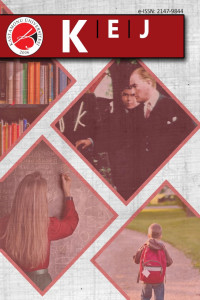Öz
Purpose: The aim of this study is to determine the artificial intelligence (AI) subjects that can be handled at the beginner level for gifted students at the 6th grade -10th level studying in Science and Art Centers (BİLSEMs) and to prepare a framework curriculum for artificial intelligence to guide teachers.
Design/Methodology/Approach: This study was also considered as a design-based research; however, it was limited to needs analysis and design dimensions. In the needs analysis phase of this study, content analysis of existing curricula was used and in the design phase, quantitative analysis based on expert opinions was used. Within the scope of the needs analysis, 54 curricula structured at undergraduate and graduate levels of 41 different universities were examined. An AI subject list was created by examining the subjects included in AI curriculums. In the design phase, the AI subject list was presented to the expert opinion. Content validity criterion was used to determine whether each topic predicted by the experts "to be in the AI curriculum" was statistically significant. Hierarchical clustering analysis was also applied to the data set including the subject that the experts marked from the subject list. Based on the content validity rates (CVR) and hierarchical clustering analysis, the framework curriculum was created by determining the prominent topics.
Findings: According to the opinions of 20 experts in the research, it was seen that eight AI subjects were at the minimum CVR value and above. In the grouping made with cluster analysis, 13 subjects were obtained. Although there is a great deal of similarity between CVR and cluster analysis results, minor differences emerged between them. Based on both analyses, 6 learning domains and 22 sub-learning domains were determined regarding the subjects to be included in the curriculum.
Highlights: When compared to the studies on AI education in the literature, the prepared curriculum mostly overlaps with machine learning techniques and learning from data. There is a need to design, implement and evaluate the results of different activities aimed at the acquisitions of the curriculum put forward as a result of the study.
Anahtar Kelimeler
Artificial Intelligence BİLSEM Gifted Students Curriculum Special Ability
Kaynakça
- AI4K12. (2018, 20 Ekim). The Artificial Intelligence for K-12. 3 Şubat 2023 tarihinde https://ai4k12.org/ adresinden edinilmiştir.
- Akkaş, E. & Tortop, H. S. (2015). Üstün yetenekliler eğitiminde farklılaştırma: temel kavramlar, modellerin karşılaştırılması ve öneriler. Üstün Zekâlılar Eğitimi ve Yaratıcılık Dergisi, 2(2), 31-44.
Öz
Kaynakça
- AI4K12. (2018, 20 Ekim). The Artificial Intelligence for K-12. 3 Şubat 2023 tarihinde https://ai4k12.org/ adresinden edinilmiştir.
- Akkaş, E. & Tortop, H. S. (2015). Üstün yetenekliler eğitiminde farklılaştırma: temel kavramlar, modellerin karşılaştırılması ve öneriler. Üstün Zekâlılar Eğitimi ve Yaratıcılık Dergisi, 2(2), 31-44.
Ayrıntılar
| Birincil Dil | İngilizce |
|---|---|
| Konular | Eğitimde Program Geliştirme |
| Bölüm | Research Article |
| Yazarlar | |
| Yayımlanma Tarihi | 29 Ocak 2024 |
| Kabul Tarihi | 27 Kasım 2023 |
| Yayımlandığı Sayı | Yıl 2024 Cilt: 32 Sayı: 1 |


